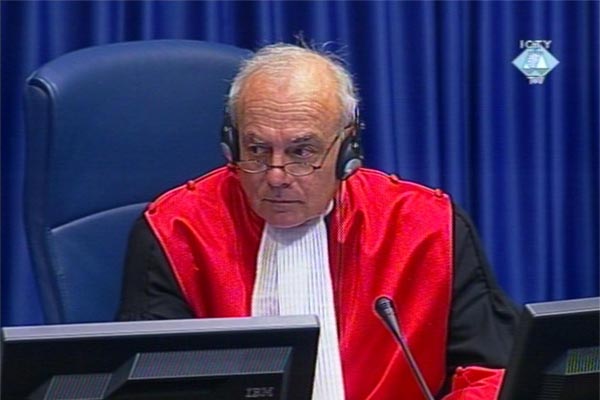Home
JUDGE ANTONETTI’S DARK THOUGHTS
The Trial Chamber will deliver its decision on Vojislav Seselj’s motion for his acquittal at the half-time of the trial on 4 May 2011. Presiding judge Antonetti has in the meantime presented his ‘observations’ on Seselj’s medical condition. According to Antonetti, ‘in the interest of the international justice and these proceedings, the accused and the Trial Chamber’, the accused should be allowed to choose the nationality of the cardiologist who will examine him
 Jean-Claude Antonetti, presiding judge in the Seselj trial
Jean-Claude Antonetti, presiding judge in the Seselj trial On 4 May 2011, the judges will render orally their decision on the motion filed by the Serbian Radicals’ leader Vojislav Seselj in which he sought to be acquitted at the half-time of the trial. The 98 bis hearing was held from 7 to 9 March 2011. At the hearing, Seselj argued that the prosecution ‘didn’t prove anything’ and that he should be released immediately. Seselj is charged with crimes perpetrated from 1991 to 1994 against non-Serbs in Bosnia and Herzegovina, Croatia and Vojvodina.
Independently from the scheduling order, the Tribunal made public the ‘observations’ of the presiding judge Jean-Claude Antonetti about the problems that the medical panel has encountered in its work. The panel consists of an endocrinologist, a pulmonologist and a cardiologist, appointed to determine the health condition of the accused. The three-member panel has done its job only partially because the accused has refused to communicate with the cardiologist whose ethnic background is ‘a problem’.
As Judge Antonetti says, the ‘health of the accused gives cause for concern’, adding that he is sure that the accused would refuse a ‘British’ cardiologist. The presiding judge contends that it would be better to appoint a cardiologist of ‘Russian nationality’ because the main goal of the judges is to get a comprehensive insight into the cardiologic problems of the accused.
The judges shouldn’t ‘take any risks’ with the health of the accused, especially in light of Slobodan Milosevic’s case, Antonetti notes. The French judge recalls that ‘some" compared Milosevic’s death ‘to judicial murder’. Judge Antonetti says he wants to avoid that the Tribunal is "discredited". He also wants to avoid the death of the accused Seselj which could occur because of lack of adequate care. As Antonetti notes, ‘I cannot allow myself that risk’ and will therefore do ‘everything in my power’ to ensure that Seselj is in the dock ‘in top form’.
The presiding judge contends that a lot of time has been lost and there is risk that the accused might die suddenly. A post mortem might then reveal that the heart and arteries of the accused were in ‘critical condition’, and this could have been prevented, Antonetti explains.
Judge Antonetti finally says he is especially ‘sensitive’ where this issue is concerned because the accused has indicated that he will sue the Tribunal and the judges. Although the judges have immunity, it would ‘not be pleasant’ to face prosecution for professional error, Antonetti notes. This is why the presiding judge believes it is ‘in the interest of international justice, these proceedings, the accused and the Trial Chamber’ for the Registry to reverse its previous decision and appoint an expert who is ‘neither an American nor a British national’. It would be best to draw up a list of experts for Seselj who could then choose one to his liking.
Judge Antonetti insists that he is making his ‘observations’ public so that if Seselj’s case ‘ends in tragedy’, all those involved could be held individually responsible for the outcome.
Linked Reports
- Case : Seselj
- 2011-03-16 SESELJ REFUSES TO SEE CARDIOLOGIST WHOSE NATIONALITY IS “A PROBLEM”
- 2011-03-09 SESELJ DEMANDS ACQUITTAL AND 10,000,000 EUROS
- 2011-03-08 PROSECUTION: ‘SESELJ’S TRIPLE CONTRIBUTION TO CRIMES’
- 2011-05-04 SESELJ’S MOTION FOR ACQUITTAL REJECTED
- 2011-05-05 ANTONETTI FOR CONTINUATION OF SESELJ TRIAL
- 2011-05-18 SESELJ TO GET MONEY IN A ‘DANGEROUS PRECEDENT’
